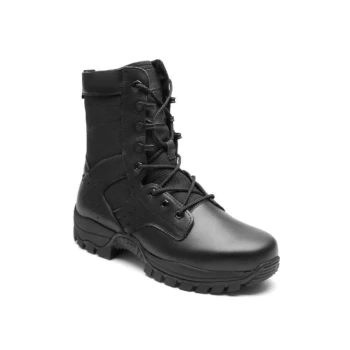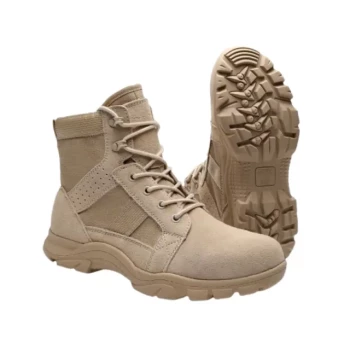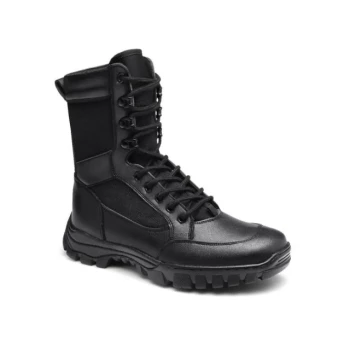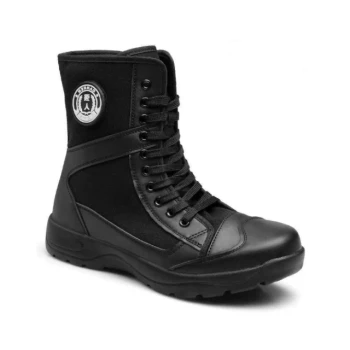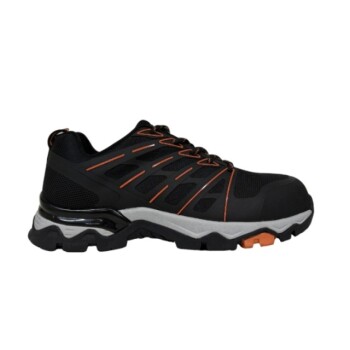Leather's reputation as a premium shoe material is built on a distinct set of functional advantages. Its primary benefits are exceptional durability, the ability to mold to the wearer's foot for a custom fit, and natural breathability, especially in high-quality variants. However, these advantages are balanced by a higher initial cost, a susceptibility to scuffs, and a vulnerability to water damage if not properly maintained.
The true value of a leather shoe is not determined by the material alone, but by its quality. High-grade leather offers superior comfort and longevity, while lower-grade options can negate its core benefits, such as breathability.
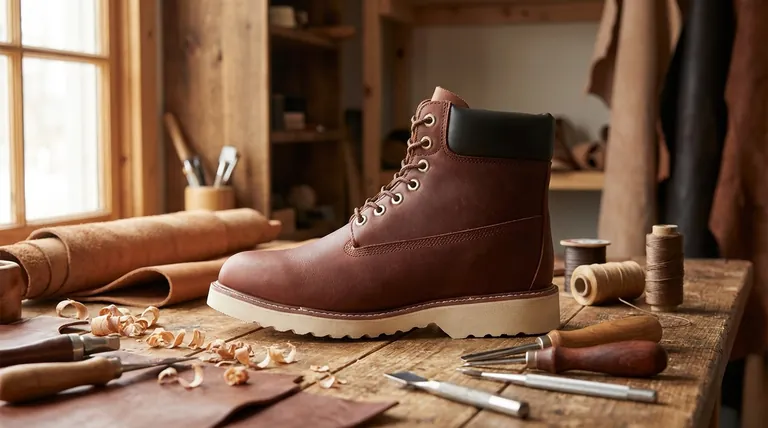
The Core Functional Benefits of Leather
Leather's unique physical structure gives it properties that are difficult to replicate with synthetic materials. These benefits are the reason it has remained a staple in quality footwear for centuries.
Unmatched Durability and Longevity
Leather is composed of a dense, interlocking matrix of protein fibers. This structure makes it highly resistant to tearing, puncture, and abrasion.
Well-cared-for leather shoes can last for years, often outliving multiple sets of synthetic alternatives. This inherent ruggedness makes it a classic choice for safety and work footwear.
A Custom, Contouring Fit
Unlike rigid synthetic materials, leather has the ability to stretch and conform over time.
As you wear the shoes, your body heat and the pressure of your foot slowly mold the material. This creates a personalized fit that provides exceptional comfort and support tailored to your unique foot shape.
Superior Breathability and Moisture Control
High-quality leather is a porous material, allowing air to circulate and water vapor (sweat) to escape. This breathability is critical for maintaining a dry, comfortable environment for your feet.
This process also helps prevent the growth of odor-causing bacteria and fungi, contributing to better foot health.
The Aesthetic and Aging Process
Beyond its functional performance, leather is prized for its appearance and the graceful way it ages. It offers a level of stylistic versatility that few other materials can match.
Developing a Unique Patina
Over time, high-quality leather develops a patina—a subtle sheen and darkening that results from use, exposure to sunlight, and the oils from your skin.
This aging process is considered highly desirable, as it gives each pair of shoes a unique character and history. Materials like nubuck, a buffed leather, develop a particularly soft, rich patina.
Versatility in Style
Leather can be treated and finished in countless ways. It can be polished to a high gloss for formal dress shoes or left with a rugged, matte finish for casual boots.
This adaptability allows it to fit seamlessly into any setting, from the boardroom to a weekend outing.
Understanding the Trade-offs and Vulnerabilities
To make an informed decision, you must recognize that leather is not without its weaknesses. These trade-offs are often directly related to the quality of the material and the level of care it receives.
The Critical Role of Quality
The term "leather" covers a wide spectrum of materials. Full-grain leather, which uses the strongest outer layer of the hide, retains its natural breathability and durability.
Lower-quality or "split" leathers, and those with heavy synthetic coatings, can trap heat and sweat, leading to discomfort. This is the single most important factor determining the shoe's performance.
Susceptibility to Environmental Damage
Leather is naturally absorbent, making it vulnerable to water damage if left untreated. Water can cause the material to dry out, stiffen, and crack.
It is also prone to scuffing and scratching, which requires periodic polishing and conditioning to repair. Proper care is not optional; it is essential for longevity.
The Upfront Investment
Genuine, high-quality leather shoes almost always come with a higher price tag than their synthetic counterparts.
While the initial cost is greater, their extended lifespan can result in a lower cost-per-wear over time, making them a sound long-term investment.
Making the Right Choice for Your Goal
Your ideal leather shoe depends entirely on your primary use case. Use these guidelines to align the material's properties with your needs.
- If your primary focus is daily professional wear: Opt for full-grain leather for its optimal balance of durability, breathability, and polished appearance.
- If your primary focus is rugged outdoor or work use: Prioritize thick, durable leathers and ensure they are properly treated for water resistance.
- If your primary focus is casual style and comfort: Consider softer leathers like nubuck or suede, but be prepared for the necessary maintenance to protect them from stains.
By understanding these principles, you can confidently select a leather shoe that serves as a long-term investment in both style and function.
Summary Table:
| Advantage | Disadvantage | Key Consideration |
|---|---|---|
| Exceptional durability & longevity | Higher initial cost | Quality of leather (e.g., full-grain) is critical |
| Molds to foot for a custom fit | Susceptible to scuffs and scratches | Requires regular maintenance (polishing/conditioning) |
| Natural breathability & moisture control | Vulnerable to water damage if untreated | Long-term cost-per-wear can be lower |
| Develops a unique, desirable patina over time | Quality varies greatly; lower grades lack benefits | Choose based on primary use case (work, casual, formal) |
Ready to Experience the Benefits of Premium Leather Footwear?
As a large-scale manufacturer, 3515 produces a comprehensive range of durable, comfortable, and stylish leather shoes and boots for distributors, brand owners, and bulk clients. Our expertise ensures you receive high-quality footwear built to last, perfectly suited for professional, work, or casual markets.
Contact our team today to discuss your leather footwear needs and discover how we can deliver value and quality for your business.
Visual Guide
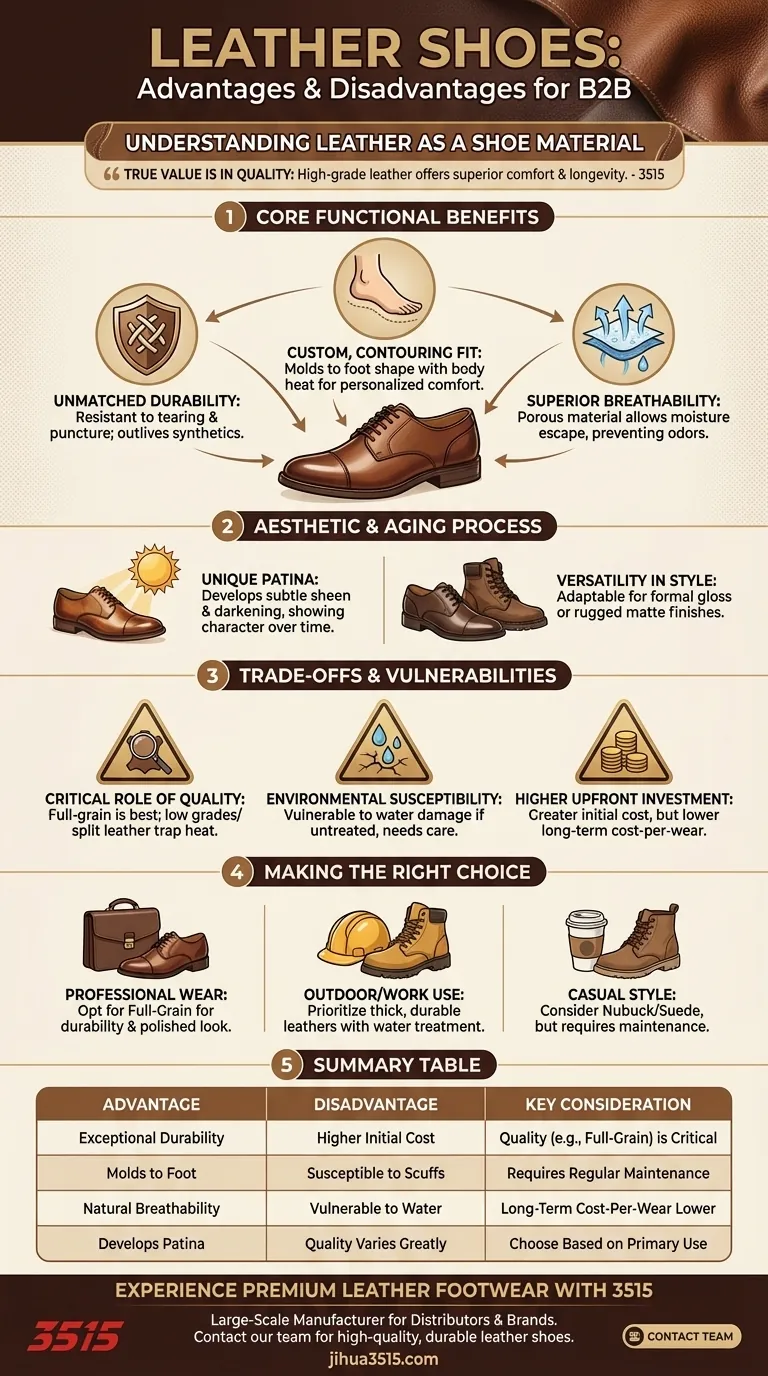
Related Products
- Wholesale Leather Work Boots with Customizable Wedge Sole for Brands
- Durable Leather Tactical Boots Wholesale & Custom Manufacturing for Brands
- Wholesale Durable Leather Work Boots | 8-Inch Goodyear Welt Manufacturer
- Durable Leather Work Boots for Wholesale & Custom Manufacturing
- Durable Leather Work Boots for Wholesale & Custom OEM Manufacturing
People Also Ask
- How does cleaning your work boots help in their maintenance? Extend Lifespan & Boost Safety
- What protection do leather work boots need? A Complete Guide to Material Care and Worker Safety
- What are the best practices for storing leather work boots? Preserve Your Investment for Years
- What maintenance tips are recommended for leather safety footwear? Extend Lifespan & Preserve Safety
- What are the advantages of leather uppers in work boots? Unmatched Durability & Protection

